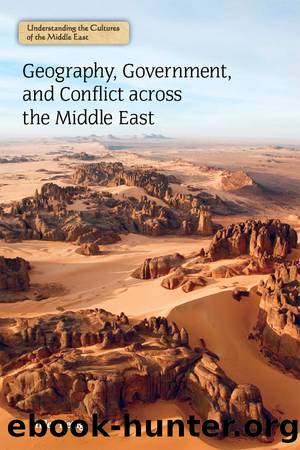Geography, Government, and Conflict Across the Middle East by Heing Bridey;

Author:Heing, Bridey; [Heing, Bridey]
Language: eng
Format: epub
Publisher: Cavendish Square Publishing LLC
Hosni Mubarak stepped down in early February 2011, and the following month a referendum passed term limits, judicial supervision of elections, and other restrictions designed to ensure the next president followed democratic principles. A new parliament, called the Peopleâs Assembly, was elected the following year, and in May, Mohammed Morsi was elected president. Morsi, a member of the long marginalized Islamist party the Muslim Brotherhood, was not in office long; in June 2013, he was ousted by a military coup and the constitution was suspended. The following year, military officer Abdel Fattah al-Sisi was elected president.
Although the Peopleâs Assembly and president are elected by popular vote, concerns have been raised that the current system is similar to the system under Mubarak, in that the president has too much power with few checks and balances. Today, the military dominates the government through the presidency, and opposition figures and groups are largely marginalized once again.
Israel and Palestine
Israel and Palestine, discussed together due to their interconnected governance, comprise a small strip of land about the same size as Maryland. The area is bordered by the Mediterranean Sea on the west and Lebanon, Syria, Jordan, and Egypt on land. Israel makes up the bulk of the area, with the Gaza Strip in the southwest corner along the Mediterranean and the Sinai Peninsula, and the West Bank in the east bordering Jordan.
Israel, the Gaza Strip, and the West Bank are all governed by separate governments. Israel is a multiparty parliamentary system, with a president and a prime minister. The parliament, called the Knesset, is voted into office for four-year terms by popular elections. The Knesset selects the president, and the president nominates a prime minister who is suggested and approved by the Knesset. While the president serves as a ceremonial figure in Israeli politics, the prime minister is the functional head of the government, representing the country overseas and largely setting the tone for the countryâs politics.
Israeli Prime Minister Benjamin Netanyahu and PA leader Mahmoud Abbas are seen here meeting ahead of ongoing peace talks.
Download
This site does not store any files on its server. We only index and link to content provided by other sites. Please contact the content providers to delete copyright contents if any and email us, we'll remove relevant links or contents immediately.
| Ancient & Classical | Anthologies |
| British & Irish | Children's |
| Comedy | LGBT |
| Medieval | Regional & Cultural |
| Religious & Liturgical | Shakespeare |
| Tragedy | United States |
| Women Authors |
Cecilia; Or, Memoirs of an Heiress — Volume 3 by Fanny Burney(30961)
Cecilia; Or, Memoirs of an Heiress — Volume 2 by Fanny Burney(30918)
Dialogue by Robert McKee(3601)
The 101 Dalmatians by Dodie Smith(2950)
Bound by Hatred (The Singham Bloodlines Book 2) by MV Kasi(2698)
Harry Potter and the Cursed Child - Parts One and Two by John Tiffany(2585)
The Beautiful Boys: A High School NA Reverse Harem Paranormal Bully Romance (Shadowlight Academy Book 1) by Gow Kailin(2506)
The Art of Dramatic Writing: Its Basis in the Creative Interpretation of Human Motives by Egri Lajos(2425)
Carrie's War by Nina Bawden(2110)
Angels in America by Tony Kushner(2057)
Unlaced by Jaci Burton & Jasmine Haynes & Joey W. Hill & Denise Rossetti(2031)
A Clockwork Orange by Anthony Burgess(1951)
The Femme Playlist & I Cannot Lie to the Stars That Made Me by Catherine Hernandez(1897)
Drama by John Lithgow(1890)
Open Book by Jessica Simpson(1801)
Outside Woman (BWWM Amish Romance) by Stacy-Deanne(1743)
Terrorist Cop by Mordecai Dzikansky & ROBERT SLATER(1725)
Yerma by Federico García Lorca(1651)
Leo's Desire by Sundari Venkatraman(1600)
